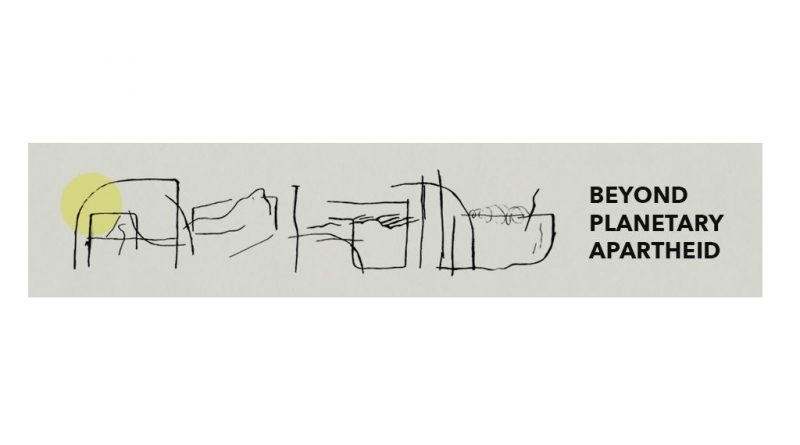Call for papers | International Conference “Beyond Planetary Apartheid”
DEADLINE: December 15, 2017
DATE: 9 to 11 May 2018
The contemporary physical, socio-cultural and political worlds are being increasingly compartmentalised. In this conference, we want to discuss whether, and to what extent, are the global society and space moving toward a state of generalised and planetary, if creeping, apartheid – borrowing on ideas of Agier (2014), Brenner (2013), and Yiftachel (2009). While we observe settler colonialism becoming a global and transnational phenomenon (Veracini 2010; Wolfe 1999), apartheidisation represents one of its forms in a continuous relationship with other political forces/processes, and in the consolidation of multiple (in)visible borders. Be they justified in the name of fear and insecurity or rather progress and development, a myriad of inter-related factors and processes (at micro-, meso-, and macrolevels) are pushing toward the proliferation of spaces of (in)voluntary exclusion often characterised by states of exception (Agier 2014; Agamben 2003). While some thinkers have reasons to believe that all such trends will be intensified in the foreseeable future as a result of climate change and the subsequent socioeconomic and ecological crises (Agier, 2014; Frase 2016; Hage 2016; Welzer 2012), it is high time for an in-depth, grounded and forward-looking discussion of contemporary forms of apartheid.
Our intent is to take some steps beyond the analysis and exposure of the various forms of segregation, fragmentation, polarisation, gentrification, ghettoisation, militarisation, and ultimately apartheidisation, observed around the globe (cf. Graham and Marvin, 2001; Diken 2004; Graham, 2010; Rossi and Vanolo, 2012 [2010]; Pappé, 2015; Lees, 2016; Tulumello, 2017, among others); and question what are the (bio-)political, ideological discourses and practices, be they hegemonic or banal, that shape those very phenomena. The set of questions we are interested to discuss includes, but is not limited to:
- What are the political dimensions of planetary apartheid? Is it a (global, locally shaped) political project? Or another dimension of the post-political (Wilson and Swyngedouw, 2014)?
- Is planetary apartheid the consequence of an excess of human beings with no place in the current socioeconomic system (Bauman 2004)?
- Or are such different forms of apartheid rather the place where the ‘political’ (cf. Mouffe, 2000) is again alive and kicking, by taking modes and strategies for instance in the form of insurgence (Roy, 2009)?
- How are settler colonial projects – or post-colonial accumulation strategies – changing across the world, and what are the main strategies of resistance in such contexts?
- What are the current characteristics of gender apartheid that has been promoted and justified throughout many different contexts around the world?
- How are contemporary cities being reshaped by processes of (in)voluntary inclusion/exclusion and fragmentation?
- And what do contemporary trends tell us of urban and global futures?
- What are the institutional discourses, the ideological and urban principles, the types of politics, the social interactions that make ‘new’ spaces become places in an anthropological and geographic sense?
The types of spaces that reflect what we have in mind are, but not limited to: refugee camps, detention camps/centres, workers camps, colonial settlements, resettlement schemes, illegal districts, rehousing programmes, ‘alternative’ and/or gated communities, alphavilles, gang spaces, security and safety zones, ‘natural reserves’; and are sometimes related to circumstances such as: mega events, tourism and conservation, natural disasters, conflicts, wars and terrorism, gendered discriminations/asymmetries, urban polarization and fragmentation, and so forth.
This endeavour means opening up to conceptualisation and comparison across space and time. We invite both empirically grounded and theoretically informed contributions capable of thinking about, and beyond, the forms of contemporary apartheid in historical, genealogical and forward-looking perspective. By calling geographers, architects, urban planners, anthropologists, historians, political scientists, sociologists, philosophers, and activists with a word on the matter, in this multidisciplinary conference we aim to present a crosscut perspective of the phenomenon of planetary apartheid, discussing such spaces and going beyond the mainstream critiques, avoiding any Manichaean visions between settlers/colonisers and natives/colonised, discussing dystopian presents and futures. This conference also welcomes artistic and performative contributions: video/film, photography, painting(s), installations, or any other type of art to be exhibited and discussed during the conference.
SUBMISSION
The conference welcomes paper and artistic proposals. Paper proposals should include author’s pen name, affiliation, short bio blurb (max. 100 words), title, abstract (max. 300 words), and three keywords. The artistic proposals should include artist’s name, description (max. 100 words) and should be accompanied by photograph and data about their size. Proposals in English are due on December 1st, 2017, and should be emailed to: planetaryapartheid@ics.ulisboa.pt. Applicants will be informed of the conference scientific committee’s decision by mid of January 2018. We expect all speakers to participate in the complete program of our conference.
REGISTRATION
A small fee will be requested to speakers to help covering the conference’s costs. We are awaiting responses from potential funders, and our aim is keeping the fees as low as possible. Exact values will be defined ASAP. In any case, fees will be minor or equal to: -100€ – professors, researchers and other professionls -50€ – students -Participants with affiliation in, or coming from, countries not considered by the World Bank as High Income economies will be exempted from paying any fee.
For further INFORMATION, please check out our website or contact us: planetaryapartheid@ics.ulisboa.pt
![]() This work is licensed under a Creative Commons Attribution-NonCommercial-ShareAlike 4.0 International License.
This work is licensed under a Creative Commons Attribution-NonCommercial-ShareAlike 4.0 International License.




